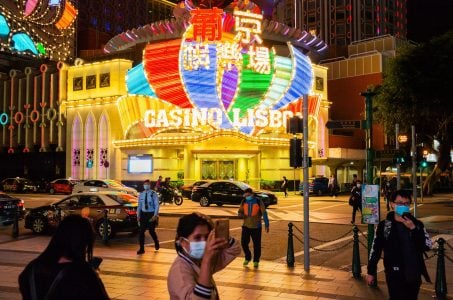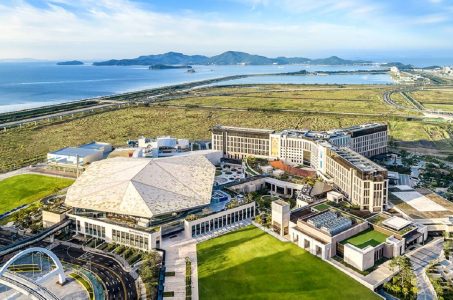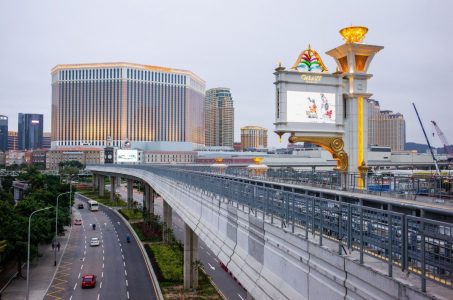Macau Concessionaires Facing ‘Significant Risks,’ Says Moody’s
Posted on: July 18, 2022, 04:28h.
Last updated on: July 19, 2022, 11:47h.
On the heels of news that Macau is extending the temporary closure of casinos by another five days, it’s safe to say concessionaires there face considerable operational risk.

The new restrictions equal the special administrative region’s second round of casino closures since the onset of the coronavirus pandemic. As a result, analysts view the third quarter as a lost cause for operators and are forecasting slack revenue figures from mass market players.
We estimate gross gaming revenue (GGR) for the mass segment — the key contributor to gaming operators’ profit and cash flow — will weaken to 30% of 2019 levels this year, before improving to 70% in 2023. We expect a full recovery in the mass segment only in 2024, which will lead to a significant improvement in the gaming operators’ credit metrics,” said Moody’s Investors Service in a new report.
Further straining Macau operators is the point that a recovery in VIP betting is unlikely due to closures of junkets that serviced the SAR. The six Macau concessionaires are Galaxy Entertainment, Las Vegas Sands (NYSE:LVS), Melco Resorts & Entertainment (NASDAQ:MLCO), MGM Resorts International (NYSE:MGM), SJM Holdings, and Wynn Resorts (NASDAQ:WYNN).
For Macau Concessionaires, Geography Matters
With the Macau recovery timeline consistently lengthening, geography matters for operators. Said another way, the more diverse their property portfolios are, the better.
SJM Holdings has a Macau-only presence, perhaps explaining why that operator is universally viewed as the most financially imperiled of the casino companies there.
Among US companies that don’t produce semiconductors, LVS and Wynn are among the most dependent on China (Macau) for revenue. With the casino hub essentially a ghost town, for the time being, Sands is increasingly dependent on Marina Bay Sands in Singapore, while Wynn needs to wring more upside out of its US venues in Boston and Las Vegas.
“MGM is the most insulated from continued weakness in the Macao gaming market because of the strong recovery in its extensive US operations,” adds Moody’s. “SJM is highly exposed, not only because of its exclusive footprint in Macao but also because high operating expenses are driving EBITDA negative, which can further increase debt and weaken both liquidity and capital structure.”
Slow Recovery Problematic
Nearly seven months into 2022, it’s becoming clear that barring a miracle, Macau’s recovery will be put off until 2023, and that’s a best-case scenario.
“It could occur mainly because of continued travel restrictions and business closures amid the resurgence of the pandemic. In this downside scenario, we assume mass GGR will return to only 60% of pre-pandemic levels in 2023 and 80% in 2024. As a result, credit metrics of Macao-focused operators will remain very weak till 2024, and their ratings will come under heightened pressure,” concludes Moody’s
In a note to clients today, Morgan Stanley upgraded Wynn Macau to “overweight” from “equal-weight” while reiterating an “overweight” rating on Sands China. The bank rates MGM China “equal-weight.”
Those are the Macau arms of the trio above of US-based gaming companies.
Related News Articles
South Korea’s Foreigner-Only Casinos See Mixed Performances in October
Sands China Unlikely to Restart Dividend Before 2024, Say Analysts
Macau Casino Stocks Could Be Boosted by China Stimulus Plans
Most Popular
Las Vegas Overstated F1 Race’s Vegas Impact — Report
Vegas Strip Clubs Wrestle in Court Over Animal Names
Most Commented
-
End of the Line for Las Vegas Monorail
— April 5, 2024 — 90 Comments -
Mega Millions Reportedly Mulling Substantial Ticket Price Increase
— April 16, 2024 — 6 Comments -
Long Island Casino Opponents Love New York Licensing Delays
— March 27, 2024 — 5 Comments -
Nearly Abandoned Mall Outside Vegas Soon to Have Only One Tenant
— March 12, 2024 — 5 Comments
















No comments yet